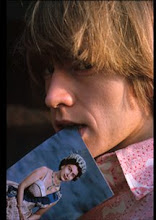














So much has been written about the mythical Roger Keith "Syd" Barrett, one of music's most beloved cult heroes. At the peak of his powers, Syd shone as bright as the sun, as band mate Roger Waters would sing of him years later, drawing in so many who were privileged to be in his orbit. Syd was in all ways the brightest star - witty, charming, gorgeous, talented and charismatic, and like all stars that burn that bright, he shone for only a precious short time. Whether it was because of the pressures of being a pop star, or the copious amounts of acid he imbibed (often unbeknownst to himself; he lived with some acid missionaries who constantly spiked his beverages without his knowledge), Syd said goodbye to the music business and retreated to his mother's home in Cambridge. Although his catalog is slim, it is a treasure we are fortunate to have. Syd has long inspired those of us who feel we are outsiders - anyone who feels they could teeter on that abyss,unafraid to peer into its depths, but thankful something keeps us from falling. His solo works reveal such pain and darkness, yet there is much love and sweetness to be found as well. His was a unique poetic voice, no posturing or pretentiousness to be found.
Those wishing to know Syd's story, I recommend watching the documentary clips I've posted here - the VH-1 Legends special (the US version of the BBC's The Pink Floyd and Syd Barrett Story), as well as Which One's Pink? and others. I also recommend you immediately get your hands on The Piper at the Gates of Dawn, A Saucerful of Secrets (for the chilling "Jugband Blues," especially), The Madcap Laughs, Barrett, and Opel, a collection of outtakes. For those wanting to dip their toes in before diving in completely, the beautifully compiled An Introduction To Syd Barrett (lovingly done by David Gilmour, the "One Who Took His Place," and the one who admired him prior to that. It must be noted that songs are remixed, and Gilmour added bass to some songs). Several books have been written about his life and recording career, the most consistently praised ones being A Very Irregular Head by Rob Chapman and Random Precision: Recording the Music of Syd Barrett 1965 - 1974 by David Parker.
This past week saw the "Why Pink Floyd?" promotion begin in earnest as the band promoted their remastered back catalog of Discovery, Experience and Immersion editions. One can only hope that Immersion editions of The Piper at the Gates of Dawn and A Saucerful of Secrets will be released, hopefully containing the hitherto commercially unreleased "Vegetable Man" and "Scream Thy Last Scream," as well as concerts and BBC performances. It would be a Syd fan's dream come true.
Syd remains an unforgotten hero to those of us whose lives he touched with his wonderful words and music. Maybe he is one who keeps us from falling into that abyss. May he rest in peace...












































